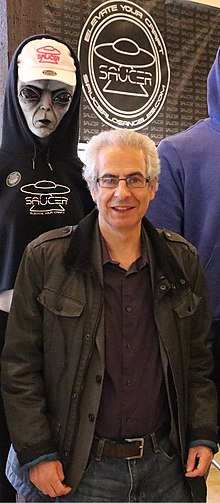Ufology Is Not A Myth
You are here
By Ssaka Spencer Mark
Ufology is the study of reports, visual records, physical evidence, and other phenomena related to unidentified flying objects (UFO). UFO reports have been subject to various investigations over the years by governments, independent groups, and scientists. However, ufology as a field has not been embraced by academia and is considered a pseudoscience by the scientific community.
In 95 percent of cases, there was a simple earthly explanation for what the witnesses had seen -- maybe aircraft lights or weather balloons. But even in those rare cases where a sighting couldn't be rationally explained,

but there was a British man called Nick Pope (born 19 September 1965) was a freelance British journalist and media commentator. He was an employee at the British Government's Ministry of Defence (MoD) from 1985 to 2006 and is best known for a role he undertook for the British Government from 1991 to 1994 which involved investigating reports of UFO sightings to determine their defence significance. Pope's job was to downplay its significance to the public, the media and British lawmakers. The message: "Move along, folks. Nothing to see here."
Pope felt it was his duty to read everything he could get his hands on about the history of UFO sightings and leading theories about their origins, including fanciful conspiracies. After he left the UFO desk in 1994, but while still at the MoD, he co-authored a book with some of the key witnesses in the Rendelsham Forest incident, known as England's Roswell.
Pope would not call himself a ufologist, rather a UFO investigator. He admits that he came about his UFO expertise in an unconventional way. Most of his fellow UFO panellists, authors and TV commentators were either inspired by their own life-altering UFO sighting or drawn to the topic as lifelong fans of the paranormal.
Becoming a Ufologist
No accurate figures exist on how many ufologists there are in the world. Ufology (the study of UFOs or unidentified flying objects) is considered a pseudoscience, though national governments have been involved in investigating UFOs. (The MoD UFO project closed down in 2009. The U.S. government is apparently still tracking them, according to the New York Times.)
As such, no traditional colleges or universities offer degree programs in ufology, but there are some online options. Ufology Web (https://www.ufologyweb.com) offers several courses in Ufology Studies, including an Introduction to Ufology taught by Richard Dolan, a well-known expert who also has a history degree from Alfred University. The 12-lecture online course covers topics such as "What are UFOs?" "Theories of Ancient Visitation," and "The Early Cover-Up." Courses cost between $49 and $127 each.
Under a "Career Options" tab, the university website notes ufologists can seek work as lecturers, writers, movie consultants or even political activists "working toward disclosure or working in the political and government arena on the area of UFOs in preparation for contact or landings." Furthermore, "You can also set up a career as a life coach or hypnotist working directly with contactees and abductees." Whether these careers turn out to lucrative will no doubt depend on the circles you move in.
Two other online universities -- the Centre of Excellence in the U.K. and the IMHS Metaphysical Institute -- offer full degree programs in ufology. It's hard to imagine a better conversation-starter than, "I recently got my Ph.D. in Ufology with a specialization in abduction research." Cost for that "advanced" degree is under $2,000.
Another approach is to get out there and do some Fox Mulder-ing of your own as a trained UFO investigator. In the U.S., the Mutual UFO Network (MUFON) is actively recruiting field investigators to look into the dozen or more sightings reported to the organization every day. You must be 18 or older and pass a certification examination based on the field investigator manual. The British UFO Research Organization (BUFORA) offers a similar course for folks in the U.K.
"My view is the world would be more interesting with aliens in it than without, but that doesn't mean I'm going to try to prove that," says Pope. "I'm just going to go where the data take me."

What about Africa; one may ask, these incidences have been noticed in Africa but just because Africans have given ufology a different view and mean. People in Africa take most of these incidences natural or in a spiritual perspective i.e. in disguise that their gods must be communicating something to them which may be of their good or bad. So, this gives us a reason why so far in may African countries its only south Africa where such incidences have been seen and documented. I believe if someone comes up to start following up ufology in Africa, I see a great deal of us finding out a lot that happens without our knowledge and from this great innovation will come up.
For more information;
Sources
https://en.wikipedia.org/wiki/Ufology
https://en.wikipedia.org/wiki/UFO_sightings_in_South_Africa
https://www.howstuffworks.com/
